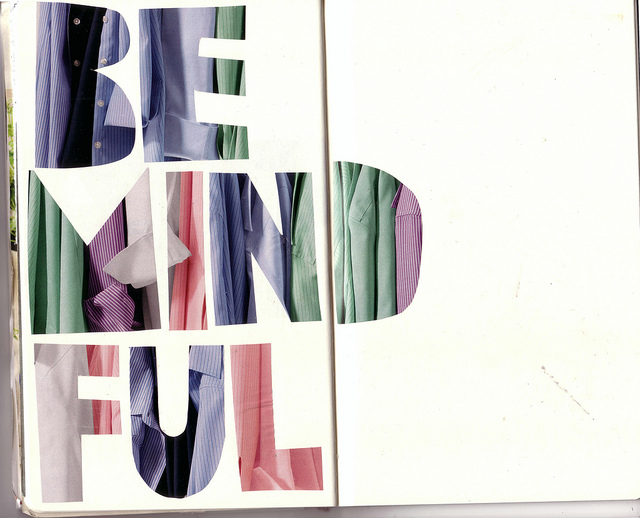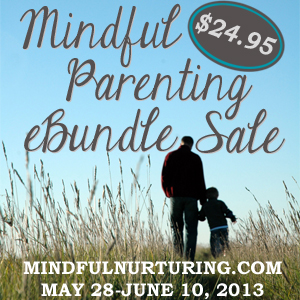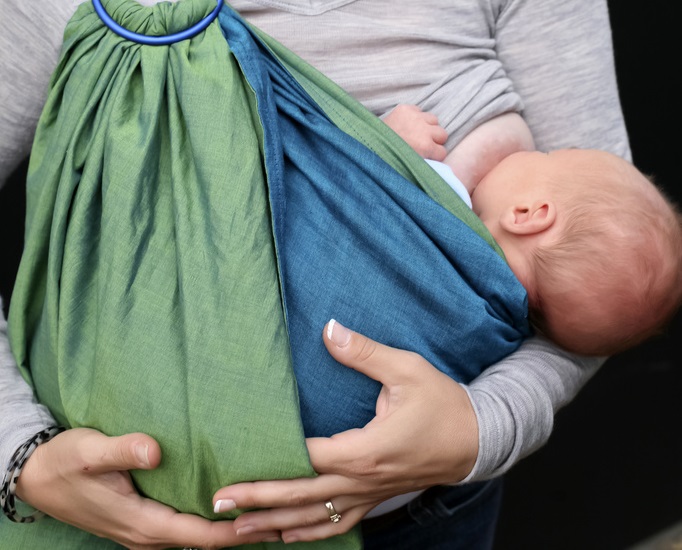“Mindfulness practice means that we commit fully in each moment to be present; inviting ourselves to interface with this moment in full awareness, with the intention to embody as best we can an orientation of calmness, mindfulness, and equanimity right here and right now.” ~ Jon Kabat-Zinn
There is an exciting parenting movement afoot that is growing by leaps and bounds. While it may be more accurate to say there are many movements afoot—positive parenting, gentle parenting, conscious parenting, spiritually-aware parenting, attachment parenting, playful parenting, and more—they are all subtle variations on a theme. The label that is resonating the most for me these days is mindful parenting.
So what is mindful parenting? I suspect that everyone practices their subtle variation on this parenting theme in their own way—I know that I am a big believer in finding your own way of doing things that works for you—but these variations have more in common than not. Here is my take on what the key points are:
Respect. Your children are people too, just as deserving of your respect as the adults in your life. When you respect them, you are modeling what respect looks like, teaching them to respect others in return.
Limits. Setting and enforcing consistent limits is critical to a child’s sense of security. It is their job to test boundaries; it is your job to ensure those boundaries are strong.
Mirroring. Your children are your mirror. This works in a couple of different ways. Children learn from watching and imitating others’ behavior much more than they do from being talked to, so BE the things you want your children to be. And if you see a “negative” behavior showing up in your children, take a look at how you are feeling and acting now to see how you might be affecting them.
Listen. We often complain that our children don’t listen to us, but it is equally true that we often don’t really listen to them. Listening to your children not only helps them to feel heard, it can give you much needed insight into the way your children’s minds work.
Connection. Even the most independent children still need a strong emotional connection with their parents. The most connected children are the most secure children, and that security enables them to be more successful in life not just in the early years, but as teenagers and beyond. When children “act out,” they are almost always feeling disconnected. Help them to feel reconnected first, then try to teach them a better way to act.
Breathe. When in doubt, take a deep breath. If you need to, leave the room. Center yourself, get yourself back to a place of loving-kindness, then reengage. Children are incredibly sensitive to energy, and will respond in kind.
Play. Children learn and communicate through play. When we get down at their level and play with them, it’s not just fun, it’s a way for us to both learn and teach. If there’s something you really want your children to learn, find a way to make it a game.
Awareness. Being aware of what’s going on with you, what’s going on with your children, what’s going on in your environment, can make a huge impact in your ability to respond instead of react.
Stay Present. Life is unfolding in the present moment, and no one is better at truly living in the present than a child. Not only is this moment of huge importance to your children because every moment is, each moment of your own life is deserving of your full attention. The more you can slow down and experience the present moment, the more fully you can experience your life and your children’s lives.
Parenting is full of a lot of little moments that can easily get to feeling like drudgery, that can easily bring up a sense of resistance in us. When we practice mindfulness, we can shift those moments, we can “do the dishes” (as Byron Katie would say) and love the task that’s in front of us, and love our children just as they are in this moment. Mindful parenting is a reminder to me that a mindful life is a full life, and every moment is a blessing with the opportunity for learning, for growth, for joy, and for love. Namaste.
Recommended Reading
Everyday Blessings: The Inner Work of Mindful Parenting, by Myla and Jon Kabat-Zinn
Mindful Parent Happy Child: A Guide To Raising Joyful and Resilient Children, by Pilar Placone
Mindful Parenting Magazine
Parenting From the Inside Out, by Daniel Siegel and Mary Hartzell
Planting Seeds: Practicing Mindfulness with Children, by Thich Nhat Hanh and the Plum Village Community
Wherever You Go, There You Are: Mindfulness Meditation In Everyday Life, by Jon Kabat-Zinn



